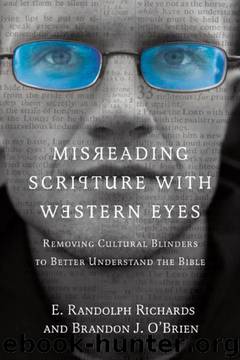Misreading Scripture With Western Eyes: Removing Cultural Blinders to Better Understand the Bible by E. Randolph Richards & Brandon J. O'Brien

Author:E. Randolph Richards & Brandon J. O'Brien
Language: eng
Format: mobi
Tags: Non-Fiction, Religion, Spirituality
Publisher: IVP Books
Published: 2012-11-04T00:00:00+00:00
So David switches strategies and tries to get Uriah to pass out drunk. He can then have the unconscious Uriah tossed into the front door of his house. But that doesn't work either. "Then David said to him, `Stay here one more day, and tomorrow I will send you back.' So Uriah remained in Jerusalem that day and the next. At David's invitation, he ate and drank with him, and David made him drunk. But in the evening Uriah went out to sleep on his mat among his master's servants; he did not go home" (2 Sam 11:12-13).
Now it is clear to everyone, including David, that Uriah will not give David an honorable way out of this mess. It was customary for Mediterranean kings merely to seize whatever they wanted. King Ahab wanted Naboth's vineyard, for example, so he took it (1 Kings 21:18). You may recall that David himself refused to do this on another occasion (2 Sam 24:24). In this case, David takes the low road. He refuses to pay Uriah to divorce his wife; instead, he arranges for Uriah to be killed. We know the story, but the narrator wants us to notice that more than Uriah (or other mercenaries) died as a result of David's decision: "some of the men in David's army fell" (2 Sam 11:17).
Nonetheless, the text gives no indication that David felt any inner remorse. We misread when we think David had a guilty conscience. David's honor is restored; Bathsheba moves in so the baby is David's. Bathsheba probably got what she wanted. Only Uriah suffered, and David likely considered it Uriah's fault. Uriah had failed to play along. He had shamed David and David retaliated. Probably in David's mind, he had made Uriah a fair offer. Cest la vie, we might say. David summarized the episode this way in a message sent to Joab: "Don't let this upset you; the sword devours one as well as another" (2 Sam 11:25).
We want you to see that the honor/shame aspect of David's culture determined his conduct. At every step, he did what was typical for a Mediterranean king at the time in a situation like this. And according to the honor/shame system of David's day, the matter was resolved. It is likely that David never gave it another thought. He was not likely tortured by a guilty conscience. There was no further recourse. All parties were satisfied or silenced.
Download
This site does not store any files on its server. We only index and link to content provided by other sites. Please contact the content providers to delete copyright contents if any and email us, we'll remove relevant links or contents immediately.
| Exegesis & Hermeneutics | New Testament |
| Old Testament |
The Five People You Meet in Heaven by Mitch Albom(3561)
The Secret Power of Speaking God's Word by Joyce Meyer(3180)
Real Sex by Lauren F. Winner(3014)
Name Book, The: Over 10,000 Names--Their Meanings, Origins, and Spiritual Significance by Astoria Dorothy(2978)
The Holy Spirit by Billy Graham(2944)
0041152001443424520 .pdf by Unknown(2843)
How The Mind Works by Steven Pinker(2813)
ESV Study Bible by Crossway(2773)
Ancient Worlds by Michael Scott(2682)
Churchill by Paul Johnson(2578)
The Meaning of the Library by unknow(2565)
The ESV Study Bible by Crossway Bibles(2550)
The Gnostic Gospels by Pagels Elaine(2527)
MOSES THE EGYPTIAN by Jan Assmann(2412)
Jesus by Paul Johnson(2352)
City of Stairs by Robert Jackson Bennett(2347)
The Complete Dead Sea Scrolls in English (7th Edition) (Penguin Classics) by Geza Vermes(2277)
The Nativity by Geza Vermes(2226)
Ancient Near Eastern Thought and the Old Testament by John H. Walton(2223)
